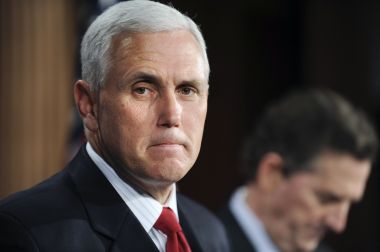Indiana House passes contentious religious freedom bill

A controversial bill which would allow business owners to refuse services according to their religious beliefs was passed by the Indiana House of Representatives on Monday.
The Religious Freedom Bill was passed by 63 votes for to 31 against, and is likely to become law. Governor Mike Pence said he supports the legislation. "[It] is about respecting and reassuring Hoosiers [residents of Indiana] that their religious freedoms are intact....I look forward to signing the bill when it reaches my desk."
The bill would stop local government from "substantially burden[ing] a person's exercise of religion".
Critics are concerned that it would result in increased discrimination, particularly against same-sex couples, who are legally allowed to marry in the State, and House Speaker Brian Bosma received 10,000 letters urging him to reject the bill. According to the Indianapolis Star, Minority Leader of the Indiana House, Scott Pelath, said the legislation would make certain groups of people feel "second-rate".
"It basically says to a group of people you're second rate, you don't matter, and if you walk into my store, I don't have to serve you," Pelath said yesterday.
Another opponent of the bill, Democrat representative Ed DeLaney, said Jesus served all people, and religious beliefs were no excuse to exclude any group. "My prophet had dinner with hookers. Was he blessing them? I hope so," he said.
However, supporters of the legislation said increased protections were vital for those trying to live out their faith with integrity. "God's word tells us to do all things unto the Lord," Republican Representative Bruce Borders said.
"If we truly are doing things unto the Lord, our business can be...a church or sanctuary. People deserve protection in their businesses as well, not just on Sunday morning."
Borders added: "I do support this bill because I could see very easily how someone with their business is asked to do something that according to what they've read in God's word, they simply cannot do it in good conscience. They simply could not do it."
The bill is modelled on the Religious Freedom and Restoration Act, a 22-year-old federal law that played a vital role in last year's Hobby Lobby case. The court ruled that closely-held businesses can uphold religious objections that allow them to opt out of contraceptive health law requirements, which was hailed as a victory for religious freedom by campaigners.
Religious freedom is a growing issue in the US, where several cases have made headlines recently. A bakery in Indianapolis achieved international notoriety last year after the Christian owners declined to fulfil an order for a gay couple. The bakery has since closed, though the owners said it was not due to loss of business.
But Jenn Wagner of Freedom Indiana, which is campaigning against the legislation, said the bill will not help religious freedom.
"It creates unintended consequences. It raises a lot of questions about how the law could be used against LGBT Hoosiers, and we simply don't need it," she told WIBC.com.
"What if [we] start talking about an EMT who doesn't want to provide service to someone who is gay and having a health care emergency? What if [we] are talking about a school counsellor who doesn't want to help a kid?"
Before the bill can become law, it will be reviewed by the state Senate.











